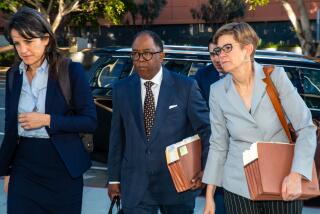Triple Slayer May Get a Third Sentencing Trial
- Share via
SANTA ANA — A judge said Monday he is leaning toward granting a new sentencing trial to triple murderer Edward Charles III but needs time to consider whether a juror’s conversation with a fellow church member affected a death penalty verdict.
Orange County Superior Court Judge Everett W. Dickey said he will make a ruling Friday, which could lead to a third penalty trial for the 24-year-old Fullerton mechanic.
A first jury found Charles guilty of murdering his parents, Edward and Dolores Charles, and younger brother, Danny, but deadlocked 11 to 1 in favor of recommending a death sentence. A second jury in April recommended that Charles be executed, saying the horrors of the family’s 1994 slaying outweighed appeals by surviving relatives to spare the young man’s life.
Defense lawyers said Charles should get a new penalty trial because a juror on the second panel consulted a church member during a weekend break in deliberations about whether Christians should be involved in decisions involving death.
Robert Sumarsono of Anaheim, one of two undecided jurors at the time, said the church member directed him to Old Testament scriptures, and he changed his vote to death, attorneys said. The jury reached its verdict recommending execution the next day.
The juror said he did not discuss the case with the church member or say he was serving on a jury.
“He was wondering what I knew about the death penalty and what I thought about it,” the church member, Albert James Friesen, testified Monday.
Friesen said he did not know why Sumarsono was asking the questions, but that Sumarsono “was upset.”
Dickey said his legal research so far has failed to turn up decisions in any similar death penalty cases, but that higher courts have said jurors must follow state law in reaching verdicts, not “God’s law.”
The judge has said the juror’s actions violated court instructions against consulting outside sources during the trial. But the more difficult question is deciding if it prejudiced the verdict.
“I probably would have removed Mr. Sumarsono as a juror and substituted an alternate if that had been brought to my attention at the time,” the judge said.
Prosecutors have argued against a new penalty phase, saying there is no evidence that the query compelled the juror to any particular penalty or that he failed to follow the law in reaching his decision.
More to Read
Sign up for Essential California
The most important California stories and recommendations in your inbox every morning.
You may occasionally receive promotional content from the Los Angeles Times.













